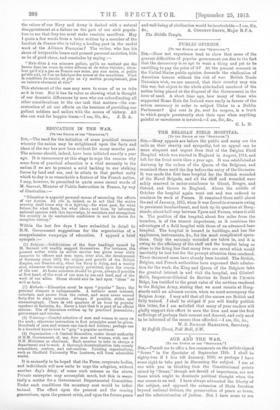EDUCATION IN THE WAR. rye TIER EDITOR OP TER "SPECTATOR. "]
Snr,—The need for the initiation of some practical measure whereby the nation may be enlightened upon the facts and ideas of the war has now been evident for many months past.
The scheme should, indeed, have been initiated exactly a year ago. It is unnecessary at this stage to urge the reasons why some form of practical education is a vital necessity to the nation if we ar•e to present a solid backing to our striking forces by land and sea, and to attain to that perfect unity which to-day is so remarkable a feature of the French nation. I may, however, be permitted to quota some recent words of M. Sarraut, Minister of Public Instruction in France, by way of illustration :— " Education is a special personal means of seconding the efforts of our Armies. Its role is, indeed, so to act that the entire country shall know why it as fighting—for what past, for what future, for what facts, for what ideas; and thus, by informing national opinion with this knowledge, to maintain and strengthen the country in its unshakable confidence in and its desire for complete victory."
Within the last few days I have submitted in detail to H.M. Government suggestions for the organization of a comprehensive campaign of education. I append a brief synopsis :- (1) Subjects.—Subdivisions of the four headings named by M. Sarraut will readily suggest themselves. For instance, the present writer while on active service has given some sixty eauseries to officers and men upon, inter the development of Germany since 1870, the origins and growth of the British Empire, our Russian ally, what the Navy is doing, and a weekly chat, whenever the enemy graciously permitted, upon the course of the war. At home accounts should be given, always if possible at first hand, of the work of our men by sea and land, and of the work of our allies. Stress should also be laid upon "ideas" as well as facts.
(2) Methods.—Education must be upon " popular " lines; the personal element is indispensable. A lecturer must interest, entertain, and amuse from the outset, and must never exceed forty-five to sixty minutes. Always, if possible, slides and cinematograph. Chats in odd quarters of an hour by popular speakers at factories, &c. Never a hint that it is part of an official scheme. Use of literature written up by practised journalists; picturesque and concise.
(3) Training.—Careful selection of men and women to carry on the work ; otherwise instruction in first principles must be given. Hundreds of men and women can teach and lecture; perhaps one in a hundred knows how to "grip" a popular audience.
(4) Organisation.—A Central Executive, under direct authority of H.M. Government, of, say, four men and women, with one of U.K Ministers as chairman. Each member to take in charge a department and to work. A thorough decentralization ink) county committees, centres, and sub-centres. Existing organizations, such as Sheffield University War Lectures, will form admirible nuclei.
It is earnestly to be hoped that the Press, corporate bodies, and individuals will now unite to urge the adoption, without another day's delay, of some such scheme as the above. Private enterprise may accomplish much, but this is essen- tially a matter for a Government Departmental Committee.
Under such conditions the monetary cost would be infini- tesimal. The effect upon the present and the coming generations, upon the present crisis, and upon the future peace and well-being of civilization would be incalculable.—I am, Sir,


































 Previous page
Previous page